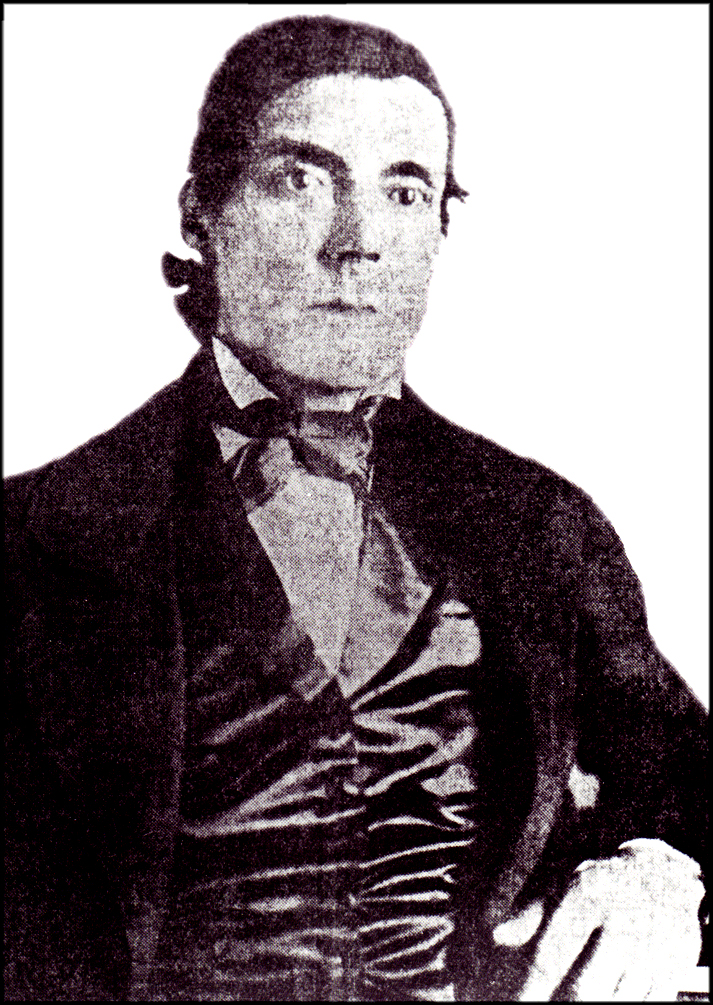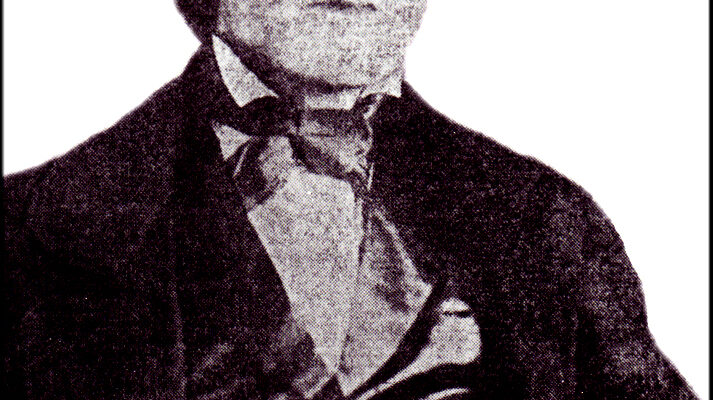Henry Johnson, Johnson City founder, passed from this life on February 25, 1874. His obituary notice was posted in the Jonesboro Herald and Tribune on March 26, 1874. Except for paragraph breaks, it is listed below just as it appeared in the newspaper:
“O, when affliction's friendly screen,
Shuts out life's elusive scene,
When thus she seals our weary eyes,
To all earth's glittering vanities,
A gleam of Heavenly light will pour,
Our dark, despairing spirits o'er.

Henry Johnson, Founder of Johnson City. ( Photo Courtesy of Betty Jane Hylton)
“Departed this life on the evening of the 25th February, 1874, in the 65th year of his age, Henry Johnson, after a long and painful illness. He was born in North Carolina, came to Tennessee, became acquainted with and married Mary Ann Hoss, in the 25th year of his age.
“Eighteen years ago, he located at Johnson City where he has since remained a prominent and highly respected citizen. He was the first citizen of this place and to his influence, untiring energy and undaunted courage does Johnson City owe its origin, ascribing to him the honor so justly inherited of proudly bearing his name.
“The respect, universal regret and sorrow manifested on his burial day, was unlike any that we have here witnessed previously and told plainly that he was beloved and respected by all who knew him.
“The remains were taken to the Presbyterian Church, attended by a large concourse of people, who had assembled to pay the last sad rites, and after the funeral services were concluded by Rev. Mr. Durham, were interred in the old family burying ground where sleeps many of his wife's relatives and two beloved children – one an infant daughter and the other an estimable, noble young man, who had fallen a victim to deadly missiles of death in the late war.
“He leaves a widow, two sons, one daughter, with many relatives, friends and acquaintances to mourn his departure. He was benevolent, hospitable, sociable and kind, ever-willing to alleviate the sufferings of the distressed, assist the poor, a friend to the widow and orphan. His door was ever open to all ministers of the gospel delighting to entertain them. No sufferer went away from him unrelieved when it was within his power to relieve them, and we know that he has gone to reap his reward.
“On the 40th anniversary of his marriage, he took the hand of her who had so long walked beside him down the declivity of life, who had shared his joys and soothed his sorrows, pressed it gently, and perfectly conscious that it was the last, told her he was “going home,” and in a short time breathed his last. But we have the blessed assurance that his ransomed spirit is now enjoying the elysian joys and rapturous delights of the “Golden City,” of which he often so beautifully spoke. Not many days previous to his death, he sang one of his favorite hymns.
“My latest sun is sinking fast,
My race is nearly run,
My strongest trials now are past,
My triumph is begun.
“And after, he had become quite deaf and his voice was so weak and tremulous that he could scarcely speak, he would greet his friends with “almost home,” almost home.” Thus has passed away from earth forever a kind and affectionate husband, an indulgent father, a useful citizen, a warm-hearted friend and a devoted Christian. Long, long will he be sadly missed.
“Around the old homestead, there hangs a gloom, a loneliness; there sits a vacant chair and hangs an unworn hat, with many, many remembrances clustering around them that will long speak forcibly of the departed. The once happy family circle is broken.
“The little affectionate grand-daughter, Minnie, in whom he was so devotedly attached, who loved him with all the ardor and fondness of a pure and childish love, in whose little heart there is a void and has learned its first bitter grief- wanders around lonely and sad.
“The once happy home is sadly changed, though beautiful flowers are budding around it, yet the hand that reared them lies cold and pulse-less in the embrace of death; but where flowers are blooming whose beauties never fade, but bloom in one perpetual summer where sorrow can never come.
“Where all is bright and beautiful in the golden streets of the New Jerusalem across the Ley River, that hand is becoming to those dear ones left behind to come, where the happy band can be reunited and never be broken by the unrelenting hand of death.
“How blest the righteous when he dies,
When sinks the weary sun to rest,
How mildly leaves the closing eye,
How gently heaves the expiring breath.
So fades the summer cloud away,
So sinks the gale when storms are o'er,
So gently shuts the eye of day,
So dies the wave along the shore.”
Henry Johnson's obituary notice, a history gem, offers yet another glimpse into the life of Johnson City's founder.

Comments are closed.